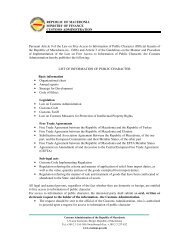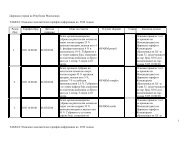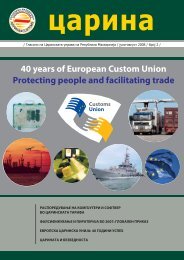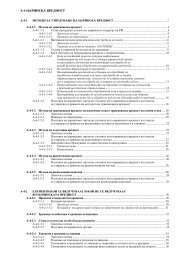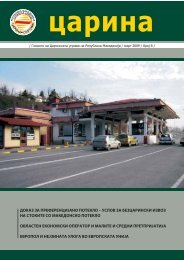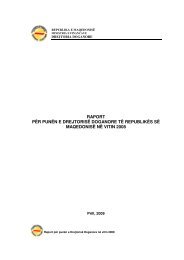REGIONAL COOPERATION AND ECONOMIC INTEGRATION
REGIONAL COOPERATION AND ECONOMIC INTEGRATION
REGIONAL COOPERATION AND ECONOMIC INTEGRATION
You also want an ePaper? Increase the reach of your titles
YUMPU automatically turns print PDFs into web optimized ePapers that Google loves.
PART III:<br />
it refers to adjusting of accounting principles and rules in accordance with Fourth and<br />
Seventh Directive of EU as well as implementation of IAS and IFRS. Due to the previously<br />
mentioned, IAS and IFRS are accepted and implemented in the big companies as well<br />
as companies who are listed on the Macedonian Stock Exchange. Also, International<br />
Standards on Auditing and Code of Ethic issued by International Federation of Accountants<br />
(IFAC) are accepted and implemented. The IAS/IFRS implementation must be result of<br />
cost-benefit analysis, and in Macedonia although implementation of IAS/IFRS imposed<br />
immense costs for companies (to engage consultants for IAS implementation and to invest<br />
in young and well educated employees, or even to change accounting software), the benefit<br />
of IAS/IFRS implementation is great and important for overall Macedonian economy:<br />
attracting foreign capital. Now in the Macedonia are in progress activities related with<br />
translation of the last versions of IAS, IFRS and ISA as well as Code of Ethics of IFAC<br />
and is expected that these pronouncements in Macedonian language will be issued at the<br />
beginning of 2010 in the Official Gazette. Until now in Macedonia are in force IAS, version<br />
from 1995, translated in Macedonian language and published at the end of 2004. This last<br />
version of IAS significantly varies with the latest version of Standards and, consequently,<br />
companies are faced with the issue which standards are valid for them: the latest one issued<br />
in Macedonian language, or the one that is latest published by the Standard Committee.<br />
Also, Macedonian regulatory bodies have planned translation of International Accounting<br />
Standards for Small and Medium Size Companies.<br />
A step further in the process of harmonization of accounting profession is in the field of<br />
accounting education. Part of this harmonization of the accounting education is The Faculty<br />
of Economics – Skopje and its Department for accounting and audit. The Department has<br />
changed its syllabus and adjusts it in accordance with IAS, IFRS and ISA as well as rules<br />
and codes of ethics of international accounting bodies (IFAC, ACCA, and CIMA). Many<br />
students after their graduation at the Faculty are enrolling ACCA studies, international<br />
certification of accountants. Students from this Department are exempt of the first five<br />
exams, out of 14. Even more, the Institute for Certified Auditors of Macedonia this year<br />
starts the activities of certification auditors with the program in accordance with the one<br />
of ACCA. This internationally recognized certification allows mobility of accountants and<br />
auditors and their ability to do accounting in accordance with international standards. Such<br />
internationally certified accountants will be able to prepare comparable financial statements<br />
in accordance with international standards and EU regulation as well as auditors will be<br />
able to perform audit in different countries as employees of any big four’ auditing firms.<br />
Big companies listed on Macedonian Stock Exchange are obliged to use IAS and IFRS in<br />
order to protect interests of the financial statements’ users and to attract potential investors,<br />
as well as it is a valuable source for the decision makers in the same companies. On that way<br />
straightforward and clear information are provided for the users of financial information<br />
with acceptable costs for their preparation. It is also an objective which is desired during<br />
the process of defining appropriate system of accounting and financial reporting. But,<br />
there are intensive activities for solving accounting problems referring to harmonization<br />
and increasingly important requirements for equal systems for financial reporting on<br />
international level. In spite of the individual characteristics of developed countries, there is<br />
a need to be considered specific characteristics for their operations in transition countries<br />
such as Republic of Macedonia.<br />
198



